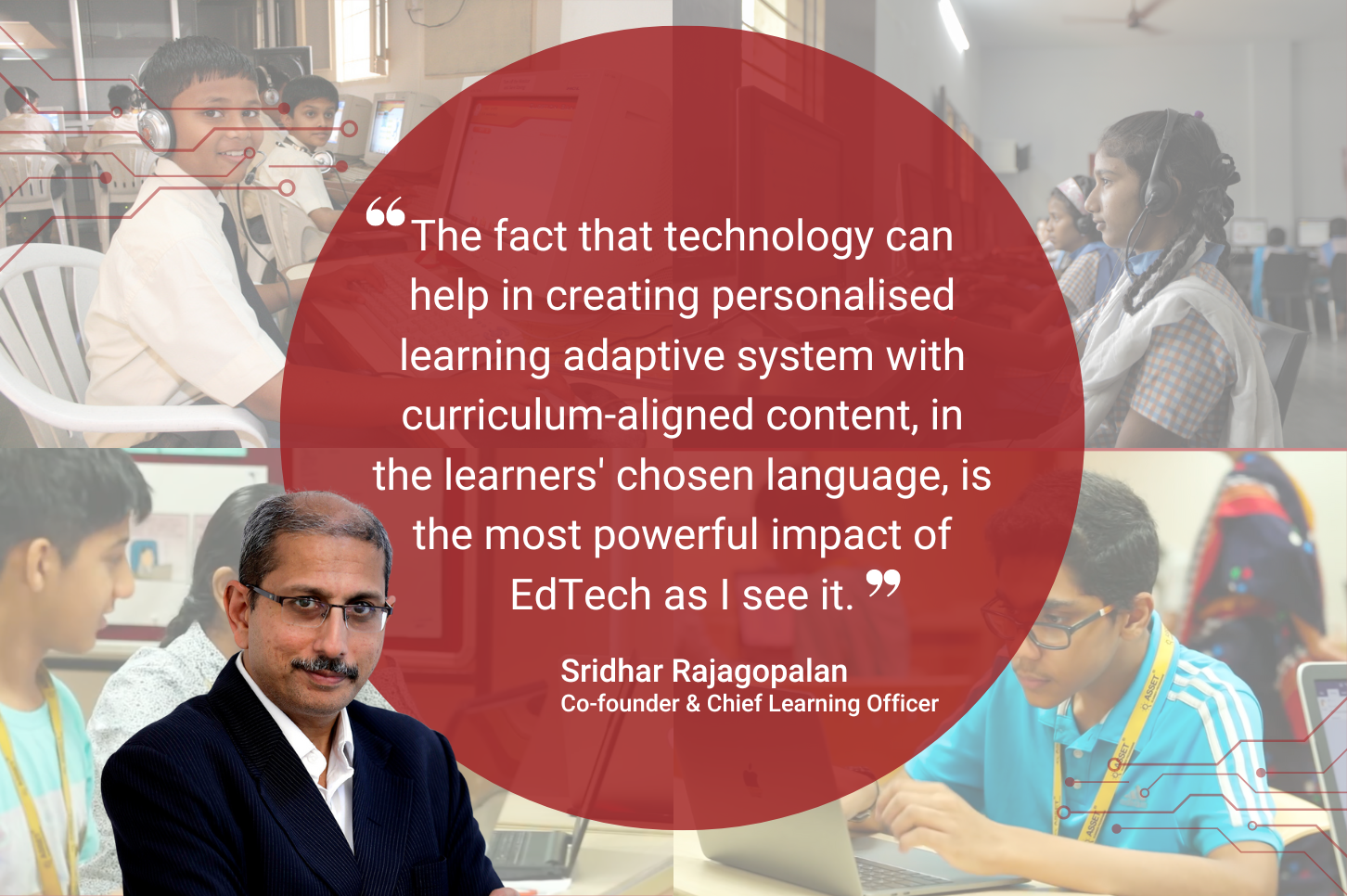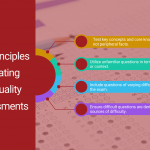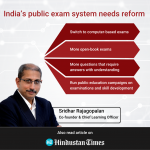- May 11, 2023
- by Sridhar Rajagopalan, Co-founder & Chief Learning Officer, Ei
- Blog, Category, Newest
- 0 Comments
‘Today, Every Student Can Potentially Self-learn Using Technology’
The interview, which was originally featured in the May 2020 edition of EDge by Central Square Foundation, proved to be so insightful that we deemed it worthy of a re-run on this National Technology Day.
Here’s an excerpt of our conversation with Sridhar Rajagopalan, the Co-founder and Chief Learning Officer at Educational Initiatives (EI), an EdTech organisation that aims to revolutionise how children in the K-12 education space learn.
CSF: You’ve been at the forefront of the evolution of EdTech in India. How far do you think we’ve come in the past few decades? What are some of the most prominent changes/ hits and misses you’ve witnessed?
Sridhar: Over a decade ago, we made a presentation about how technology could be used in education. Our questions at that time revolved around using technology to improve the operational efficiency of the system and not necessarily to directly influence learning outcomes. We used to think of technology in terms of access to smart classes, or how teachers can use it to manage the teaching-learning process. Much has changed since then. Today, every student can potentially self-learn using technology.
The fact that technology can help in creating personalized learning adaptive systems with curriculum aligned content, in the learners’ chosen language, is the most powerful impact of EdTech as I see it. That said, I believe that its use in managing assessments and in analyzing learning outcomes is yet to be explored at scale. Our focus of learning needs to shift from access to outcomes.
CSF: We know you believe in EdTech’s potential. But how significantly do you think it can contribute to improved learning outcomes?
Sridhar: For EdTech to contribute to improved learning outcomes, products need to address these questions: Are our goalposts emphasising learning with understanding, and not just learning for exams? Are our EdTech systems based on strong educational research – a Science of Learning? Can the online process take the teacher along? While all these factors need to work in tandem, an overemphasis on just one of the areas, could derail us from improving learning outcomes. Moreover, the government’s role in ensuring improved learning is crucial. We know that the lack of foundational skills in children impacts their learning trajectory as they progress in school. But imagine if the government mandated that every child in the country must possess foundational skills in the next 5 years. Could this then be a challenge for EdTech companies to solve? That will ensure a widespread learning impact.
In the absence of education reforms such as this at the national level, EdTech companies will prioritise designing apps and content based on our current rote-based system.
CSF: How does personalised learning work?
Sridhar: The value of personalised learning lies in EdTech solutions helping children and teachers identify individual areas of improvement. One of our core beliefs has been that it can have a massive impact on learning outcomes.
The other important principle is to ensure active learning. This active learning behaviour can be modelled scientifically using personalised learning. For example, if two children are struggling with the concept of decimals, it does not mean that they are making the same mistakes. We use scientific ways to break down the concept into different sub-concepts. This helps gauge the problems each of them is facing, and what question should be asked next in keeping with their comprehension levels.
However, witnessing the real power of machine learning and artificial intelligence in personalizing education will take a lot more time. Domain knowledge is a key requirement in building a good machine learning model. For instance, besides technologists, Google has linguists working on building machine learning models. Similarly in the space of education, technology needs to be backed by educational research to create truly personalised learning paths.
CSF: With EdTech, we’re trying to bridge the learning gap regardless of geographical boundaries or how inaccessible an area children live in. How can we ensure that we don’t end up exacerbating inequalities with technology? How can we incentivise for-profit companies to develop more products for the low-income segment?
Sridhar: EdTech can bridge the digital divide, but the solution must be in tandem with the government’s efforts. Even until a few years ago, when we introduced a foundational numeracy solution, we found that only 30% of the population in our target audience owned smartphones. Thus, there are multiple things and levels that need to be factored in for any real impact. The government’s support in building the infrastructure like perhaps making available affordable and good quality tablets for education, and funding are crucial components in choosing the most efficient technology or solution.
If the government can assess requirements at the state level and procure solutions in accordance to them, a change can indeed happen. The prospect of such a large-scale roll-out will spur innovation among for-profit companies who can then work on creating affordable products. We at EI have been working across 10 states, and for large scale implementations we offer Mindspark at just $2 per child.
CSF: What are some of the other key gaps in the EdTech landscape that need to be plugged for widespread adoption? How do we address these gaps?
Sridhar: I believe that India can become a global leader in EdTech. However, there are a few things we need to prioritise to get there. We need a fair and transparent system to certify solutions and products. The government could bring in academic experts as well as entrepreneurs to create benchmarks to assess the impact of products and certify impactful ones.
From a systemic point of view, there are two areas which need attention. Firstly, the lack of foundational literacy and numeracy skills in our students needs a mandated push at the national-level. Secondly, we need Board Examination reforms. Until these reforms are brought into the purview of education pan India, we will confuse EdTech solution providers on what outcome they should chase from their products.
CSF: There are a lot of stakeholders in EdTech — government, investors, researchers, product and content developers, and pedagogy experts to name a few. What are some of the things each of them need to prioritise with the objective being learning outcomes? Do you see scope for collaboration that has not yet been fully explored?
Sridhar: I believe that most education entrepreneurs, investors, and pedagogy experts do want to collaborate to improve education outcomes. We have seen great examples of bilateral collaboration with the government and need more such opportunities at a large scale based on the required systemic reform areas of foundational learning and board exams. India is participating in the PISA (Program for International Student Assessment) 2021. Bringing in experts early to help with preparation could be an immediate area for collaboration.
We need to pause and think harder about how the Science of Learning can improve the quality of learning and reduce the current focus on rote-based learning. Once the policies are reframed to incorporate this, EdTech can become one of the tools to address the challenges.



